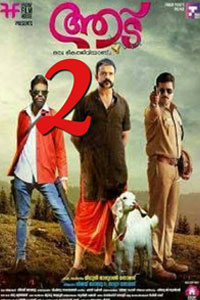'Karutha Pakshikal' ultimately belongs to writer-director Kamal, who has made the movie firmly under control. Tightly written and well-directed, he shows no nervousness handling a genre different from what he or other Malluwood commercial filmmakers have handled before. Hope he continues experimenting with such themes -- realistically and without compromises.
In a recent interview Kamal had cited that he had been compromising all these days in filmdom,and this film is the one that had the least compromises. Says Kamal, '' As all of us are making films for this hypocritical society, we try not to show the bitter truth. We hide such realities because we know people will not like to see those things''. And here the film stays apart is definitely due to its originality and nonsensical nature. Refreshingly, he hasn't allowed much stereotypes to get in the way of good storytelling -- a style that comes easily to him after his long mainstream innings. Some films attempt to showcase a series of wonderful moments and tend to go overboard, but Karutha Pakshikal captures many poignant moments and tells it as simply as it can without gimmicks, leaving you with a 'wow!'
The story of blindness has probably been told a hundred times before. And here this is added with lines of prejudice, corruption, apathy and dishonesty in the society. But what make it more effective is the emotional chords the characters strike as the story unfolds.
The film has an amazing opening sequence. From frame one, where we see a medical camp where many visually impaired hapless patients hold their eyes up to receive the drop of medicine, in search of retribution from the world of blindness. In the end of the long waiting hall with her eyes open is Malli, the younger daughter of Murugan, who came to Kerala, two decades back from Thirunelveli in search of a job. He now lives in a slum with his three children - Mayil, Azhakappan and Malli who is blind. Murugan who speaks a mix of Malayalam and Tamil, makes his living by ironing people's clothes in the hope someday she will be able to see. He takes her to every free eye-care camp in the neighborhood. His only support comes from Muthu Annan who makes pappad, his wife Kanakamma and daughter Krishnaveni.
With his meager savings Murugan manages a four-wheeled push cart and moves around various housing colonies in town with his blind daughter on board, ironing people's clothes. Every day he meets different kinds of people, who behave with all different kinds of feelings. Padmapriya appears in the film as Poonkodi who resides nearby and makes a living by begging in the streets.
Murugan's life takes a new turn when he meets Suvarna(Meena) in one of the big houses of the town , who is in the edge of life with a fatal disease. Suvarna, develops a liking towards Malli and decides to donate her eyes to the girl in the event of her death .Eventhough she signs a donation agreement, her husband thinks it demeaning to donate his wife's eyes to a very poor Tamil girl from slums.
In the course of events, Murugan's cart is set to fire in a political assault of a left leader. Murugan who find it hard to make a living thereafter, tries to find a job in other places and finally hires the cart of drunkard Shanmugham. And in a rash moment Shanmugham stabs Murugan for not giving the rent on time and Murugan is sent to hospital where there is no doctor to attend the patients following a strike. But the panic in the hospital over the agonizing patients and Murugan, as nobody wants to take responsibility, and the rustic moving simplicity of Poonkody who burst out is contrasted with the urbane nurses restraining themselves in the name of strikes instead of reaching out to their patients .There are many instances of social satire like this in the film which prove










Comments